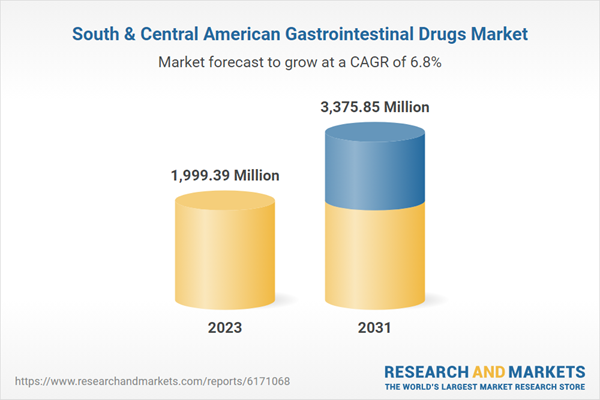Executive Summary and Market Analysis
The South and Central America region encompasses countries such as Argentina, Brazil, and other nations in the area. A key driver of market growth is the increasing geriatric population in these countries. Additionally, advancements in the healthcare sector and heightened research and development activities within the pharmaceutical industry are expected to further stimulate market expansion during the forecast period.Market Segmentation Analysis
The gastrointestinal drugs market can be segmented based on various criteria, including drug class, application, route of administration, and distribution channel.1. Drug Class: The market is divided into several categories, including biologics, antidiarrheal and laxatives, acid neutralizers, anti-inflammatory drugs, antiemetic and antinauseants, among others. In 2023, biologics accounted for the largest market share.
2. Application: The market is also segmented by application, which includes conditions such as irritable bowel syndrome (IBS), inflammatory ulcerative colitis, Crohn’s disease, gastroenteritis, celiac disease, and others. The irritable bowel syndrome segment was the largest contributor to the market in 2023.
3. Route of Administration: The gastrointestinal drugs market is bifurcated into oral and parenteral routes of administration. The oral route held a larger market share in 2023, reflecting patient preference and convenience.
4. Distribution Channel: The market is segmented into hospital pharmacies, retail pharmacies, and online pharmacies. Hospital pharmacies dominated the market share in 2023, indicating a strong reliance on healthcare facilities for medication distribution.
Market Outlook
Gastrointestinal diseases encompass a range of conditions affecting the gastrointestinal tract, including common issues like heartburn, inflammatory bowel diseases (IBD), irritable bowel syndrome (IBS), gastroenteritis, gastroesophageal reflux disease (GERD), constipation, and diarrhea. These conditions are prevalent and often chronic, affecting a significant portion of the global population. Factors such as sedentary lifestyles, changing dietary habits, and increased stress levels contribute to the rising incidence of these diseases.A recent study titled "Gastroesophageal Reflux Disease," published in July 2023, highlighted that GERD is one of the most commonly diagnosed gastrointestinal conditions, impacting around 20% of the population. This condition not only imposes a substantial economic burden due to direct and indirect costs but also significantly affects individuals' quality of life. Furthermore, the prevalence of IBS has surged in recent decades, with the International Foundation for Gastrointestinal Disorders reporting that IBS affects 10-15% of the global population. Research from the University of Gothenburg indicates that approximately 40% of adults worldwide experience some form of functional gastrointestinal disorder, underscoring the growing demand for effective treatments and driving the gastrointestinal drugs market.
Country Insights
The South and Central America gastrointestinal drugs market includes Brazil, Argentina, and other countries in the region, with Brazil holding the largest market share in 2023. Rapid urbanization in Brazil has led to significant changes in dietary habits, including increased consumption of sugar-laden beverages, coffee, and processed foods, which have contributed to various digestive disorders such as IBS and constipation.The aging population in Brazil is also a critical factor influencing market growth. According to the Pan American Health Organization, as of 2022, Brazil had over 30 million individuals aged 60 and above, representing 13% of the total population. This demographic is projected to grow to nearly 50 million by 2030, constituting 24% of the population. By 2050, it is estimated that 36% of Brazil's population will be aged 65 and older. This demographic shift is expected to increase the demand for gastrointestinal healthcare services, as older adults are more likely to experience digestive issues.
The Inflammatory Bowel Disease (IBD) National Patient Registry, initiated by the Brazilian Organization for Crohn's Disease and Colitis (GEDIIB), aims to collect epidemiological data on IBD patients in Brazil. Recent findings indicate that IBD prevalence has surpassed 60 cases per 100,000 inhabitants, particularly in urbanized areas like São Paulo and Espírito Santo. This rising incidence of gastrointestinal disorders among the aging population is a significant driver of market growth.
Company Profiles
Key players in the South and Central America gastrointestinal drugs market include major pharmaceutical companies such as Sanofi SA, GSK Plc, Johnson & Johnson, Bausch Health Companies Inc, AstraZeneca Plc, Takeda Pharmaceutical Co Ltd, AbbVie Inc, Bayer AG, and Pfizer Inc. These companies are actively pursuing strategies such as market expansion, product innovation, and mergers and acquisitions to enhance their offerings and increase their market presence.Table of Contents
Companies Mentioned
- Sanofi SA
- GSK Plc
- Johnson & Johnson
- Bausch Health Companies Inc
- AstraZeneca Plc
- Takeda Pharmaceutical Co Ltd
- AbbVie Inc
- Bayer AG
- Pfizer Inc
Table Information
| Report Attribute | Details |
|---|---|
| No. of Pages | 149 |
| Published | July 2025 |
| Forecast Period | 2023 - 2031 |
| Estimated Market Value in 2023 | 1999.39 Million |
| Forecasted Market Value by 2031 | 3375.85 Million |
| Compound Annual Growth Rate | 6.8% |
| No. of Companies Mentioned | 9 |









